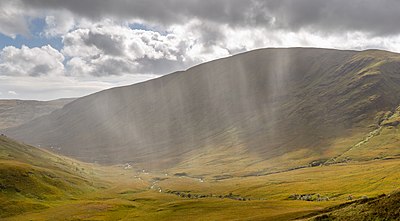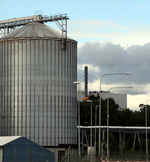Portal:Ecology
| |
|
|
Ecology
|
|
Ecology (from Ancient Greek οἶκος (oîkos) 'house', and -λογία (-logía) 'study of') is the natural science of the relationships among living organisms, including humans, and their physical environment. Ecology considers organisms at the individual, population, community, ecosystem, and biosphere levels. Ecology overlaps with the closely related sciences of biogeography, evolutionary biology, genetics, ethology, and natural history. Ecology is a branch of biology, and is the study of abundance, biomass, and distribution of organisms in the context of the environment. It encompasses life processes, interactions, and adaptations; movement of materials and energy through living communities; successional development of ecosystems; cooperation, competition, and predation within and between species; and patterns of biodiversity and its effect on ecosystem processes. Ecology has practical applications in conservation biology, wetland management, natural resource management (agroecology, agriculture, forestry, agroforestry, fisheries, mining, tourism), urban planning (urban ecology), community health, economics, basic and applied science, and human social interaction (human ecology). The word ecology (German: Ökologie) was coined in 1866 by the German scientist Ernst Haeckel. The science of ecology as we know it today began with a group of American botanists in the 1890s. Evolutionary concepts relating to adaptation and natural selection are cornerstones of modern ecological theory. Ecosystems are dynamically interacting systems of organisms, the communities they make up, and the non-living (abiotic) components of their environment. Ecosystem processes, such as primary production, nutrient cycling, and niche construction, regulate the flux of energy and matter through an environment. Ecosystems have biophysical feedback mechanisms that moderate processes acting on living (biotic) and abiotic components of the planet. Ecosystems sustain life-supporting functions and provide ecosystem services like biomass production (food, fuel, fiber, and medicine), the regulation of climate, global biogeochemical cycles, water filtration, soil formation, erosion control, flood protection, and many other natural features of scientific, historical, economic, or intrinsic value. (Full article...) Selected article - Hydrology (from Ancient Greek ὕδωρ (húdōr) 'water', and -λογία (-logía) 'study of') is the scientific study of the movement, distribution, and management of water on Earth and other planets, including the water cycle, water resources, and drainage basin sustainability. A practitioner of hydrology is called a hydrologist. Hydrologists are scientists studying earth or environmental science, civil or environmental engineering, and physical geography. Using various analytical methods and scientific techniques, they collect and analyze data to help solve water related problems such as environmental preservation, natural disasters, and water management. Hydrology subdivides into surface water hydrology, groundwater hydrology (hydrogeology), and marine hydrology. Domains of hydrology include hydrometeorology, surface hydrology, hydrogeology, drainage-basin management, and water quality. (Full article...)Selected image - Credit: Mnolf A Venus Flytrap (Dionaea muscipula) closing after receiving a stimulus. Venus Flytraps are carnivorous plants that catch and digest animal prey—mostly insects and arachnids.
General imagesThe following are images from various ecology-related articles on Wikipedia.
Related WikiProjectsThings you can do
Entries here consist of Good and Featured articles, which meet a core set of high editorial standards.
 Camouflage is the use of any combination of materials, coloration, or illumination for concealment, either by making animals or objects hard to see, or by disguising them as something else. Examples include the leopard's spotted coat, the battledress of a modern soldier, and the leaf-mimic katydid's wings. A third approach, motion dazzle, confuses the observer with a conspicuous pattern, making the object visible but momentarily harder to locate, as well as making general aiming easier. The majority of camouflage methods aim for crypsis, often through a general resemblance to the background, high contrast disruptive coloration, eliminating shadow, and countershading. In the open ocean, where there is no background, the principal methods of camouflage are transparency, silvering, and countershading, while the ability to produce light is among other things used for counter-illumination on the undersides of cephalopods such as squid. Some animals, such as chameleons and octopuses, are capable of actively changing their skin pattern and colours, whether for camouflage or for signalling. It is possible that some plants use camouflage to evade being eaten by herbivores. Military camouflage was spurred by the increasing range and accuracy of firearms in the 19th century. In particular the replacement of the inaccurate musket with the rifle made personal concealment in battle a survival skill. In the 20th century, military camouflage developed rapidly, especially during the First World War. On land, artists such as André Mare designed camouflage schemes and observation posts disguised as trees. At sea, merchant ships and troop carriers were painted in dazzle patterns that were highly visible, but designed to confuse enemy submarines as to the target's speed, range, and heading. During and after the Second World War, a variety of camouflage schemes were used for aircraft and for ground vehicles in different theatres of war. The use of radar since the mid-20th century has largely made camouflage for fixed-wing military aircraft obsolete. (Full article...)Selected biography - Did you know (auto-generated)
Selected quote -
Ecology news
Additional News Highlights
Selected publication -Landscope is the quarterly journal of Western Australia's Department of Environment and Conservation. It publishes technical and popular articles on matters related to the conservation and management of natural resources in Western Australia. First published in 1985, it was partially a continuation of S.W.A.N.S.: State Wildlife Advisory News Service, a newsletter of Western Australia's Department of Fisheries and Fauna. (Full article...) Related portalsMore did you know -Related articlesAssociated WikimediaThe following Wikimedia Foundation sister projects provide more on this subject:
Web resources
Discover Wikipedia using portals |















































